Edition 48: November 2021
-
Helpful contacts
Employee Assistance Program: 1800 099 444
Nurse & Midwife Support: 1800 667 877
Nurse & Midwife Health Program:
03 9415 7551 or 1800 888 236 -
Upcoming Dates
November 2021
12 UoM Centre for Digital Transformation Health scholarships close
24 High Flow Oxygen Webinar
25 Inspire Awards
-
The Nursing & Midwifery Executive
Adjunct Professor Shane Crowe
Executive Director of Nursing & Midwifery
Phone: 8345 1463
Email: shane.crowe@wh.org.auProfessor Bodil Rasmussen
Chair of Nursing, Deakin University/Western Health
Phone: 8395 8163
Email: bodil.rasmussen@wh.org.auDoug Mill
Director of Nursing & Midwifery
Divisions: Chronic & Complex Care, Drug Health
Phone: 8345 1916
Email: douglas.mill@wh.orh.auHelen Sinnott
Director of Nursing & Midwifery, Sunshine
Divisions: Women’s & Children’s, Clinical Support & Specialist Clinics
Phone: 0435 962 716
Email: helen.sinnott@wh.org.auJo Mapes
Director of Nursing & Midwifery, Footscray Hospital
Division: Perioperative and Critical Care
Phone: 0423 302 337
Email: joanne.mapes@wh.org.auKate Renzenbrink
Director of Nursing & Midwifery Informatics (CNMIO)
Phone:
Email: kate.renzenbrink@wh.org.auProfessor Linda Sweet
Chair of Midwifery, Deakin University/Western Health
Phone: 8395 1178
Email: linda.sweet@wh.org.auLisa Gatzonis
Acting Director of Nursing & Midwifery, Williamstown Hospital
Director of Nursing & Midwifery Workforce
Division: Aged Cancer and Continuing Care
Phone: 9393 0127
Email: lisa.gatzonis@wh.org.auMandy Cullen
Acting Director of Nursing, Melton Health
Phone: 0409 526 923
Email: mcullen@djhs.org.auNicole Davies
Director of Nursing & Midwifery, Sunbury Day Hospital
Division: Emergency, Medicine & Access, Western PHU
Phone: 9732 8630
Email: nicole.davies@wh.org.auRohan Vaughan
Director of Nursing, Bacchus March Hospital
Phone: 0434 365 769
Email: rohan.vaughan@wh.org.auSue Sweeney
Director of Midwifery Practice
Phone: 0466 801 447
Email: sue.sweeney@wh.org.auAssociate Professor Tony McGillion
Director of Nursing & Midwifery (Inspiring Innovation)
Phone: 0466 925 108
Email: tony.mcgillion@wh.org.au
From Shane
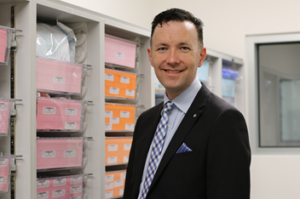
As we emerge out of lock-down, with Victoria having achieved 80% double-vaccination it has been wonderful to start doing those enjoyable things again. Personally, lock-down has made me reflect on the little things in life that make me grateful. For me, I am grateful for brunch at a cafe with family. I am grateful that they serve my favorite coffee in a proper cup – it isn’t the same in the takeaway cup! I am grateful for evenings laughing with friends and traveling into the countryside again. I am grateful for my family and everything that they have done to support me over the past challenging 18 months
Of course, as our society starts to return to normal, our health service is the busiest that it has been during any of our careers. At Western Health we are amongst the busiest in Victoria again – and we are doing it in that quintessential can-do Western Health way. We are doing it together, so my gratitude absolutely extends to my professional life. I am grateful to my colleagues for their support, resilience and leadership; grateful for my team – they are truly amazing! I am grateful our our interdisciplinary colleagues for all the efforts made to support our nurses, midwives and our patients. I am also sincerely grateful for our nursing and midwifery teams for the amazing response that we have had to planning for COVID surge and for your commitment to our community.
We have had over 260 nurses volunteer to be redeployed if needed, with 110 of these nurses having already been redeployed. This has allowed us to expand up to 33 ICU beds, open 4 COVID wards, open additional Emergency Department zones and provide additional support for areas that are incredibly busy and looking after really unwell patients.
I am grateful to the huge numbers of nurses and midwives that are supporting their colleagues to work in new environments. We have commenced implementing team based models in our wards and departments, and I am grateful to the many RUSONs and RUSOMs that have joined our teams to support us to continue to provide Best Care – they are our future nursing and midwifery colleagues. I am grateful to you all for making all new members of the team feel welcomed, supported and valued.
I know just how challenging it can be to work in a new ward, clinical setting or service and work with a more diverse team with varying skills. Our collective focus on supporting our colleagues with orientation, education, and appropriate supervision to ensure that they are safe whilst they build competence and confidence is so important, and it is really impressive to see it being done so well. We are all working together as one team to care for each other, as well as our patients.
I am immensely grateful for the really special culture that we enjoy at Western Health, and it is something that we need to nurture and actively protect. Challenging times are usually when a culture is put to the test, but at Western Health we thrive. In times of adversity it is brilliant to see how the Western Health team all come together to care for our patients and each other.
I am grateful that every day I see evidence of us all continuing to be kind and considerate with each other, extending a warm welcome to new staff and valuing the contribution of each other.
I am so proud and exceptionally grateful to be working with you all.
Shane Crowe
Executive Director, Nursing & Midwifery
COVID Surge - what are we expecting?

The modelling undertaken by the Burnett Institute which was updated in mid October shows Victoria’s pace and high levels of vaccination has almost-halved the projected number of people expected to die from COVID-19 before the end of the year.
Whilst modelling is only as good as the assumptions made, this new modelling accounts for the lessened length of stay being seen across Victorian hospitals and the vaccination rates being better than initially predicted.
The graphs to the right shows easing of restrictions at 70% vaccination (red line) versus 80% (blue line – which is what occurred).
The modelling projects that the chances of overwhelming the hospital system have dropped from 63 per cent to just 23 per cent.
Based on the current epidemic growth rate, diagnoses in Melbourne are estimated to reach a peak between 15-27 October. The easing of restrictions is likely to lead to a second peak in infections and diagnoses, however hospital and ICU use may remain relatively flat rather than declining.
There is a higher level of optimism moving forward. The updated modelling anticipates that:
- we hit the peak of hospital presentations in late October and early November,
- hospital and ICU demand will actually remain fairly stable at this peak level into November and December,
- there is a significantly flattened curve when compared to what was initially modelled,
- whilst less of a peak, it is expected to remain at a heightened level for a slightly longer period into the new year.
What does this mean for our workforce planning?:
The good news is that we have a lot of workforce capacity at Western Health. We have over 150 nurses that have volunteered to be redeployed, that have not been needed as yet. We have deliberately tried not to touch many of our wards, so we can keep our teams intact where wherever possible. The nurses that have been redeployed have been predominantly from areas where clinical activity has decreased.
We continue to actively recruit, and continue to have lots of new nurses, RUSONs and RUSOMs commencing over the coming weeks.
Additionally, it is anticipated that the COVID vaccination program will start to get quieter towards the end of November. We are actively working with this team to look at options for them into the future, and no doubt many of them will be available and willing to work in other Western Health locations. We are keen to keep them working with us.
We have been able to maintain nurse to patient and midwife to patient ratios in our wards, and in fact in many areas we have been able to enhance staffing levels to support higher acuity levels and in preparation.
We are in a really good place to be able to safely care for the predicted increased demand over the coming weeks and months.
Whilst this year Christmas and New Year will be busier that they usually are, we are looking at every opportunity to try and support our nurses and midwives to be able to get some leave. We are hopeful that the extra recruitment that we have undertaken will make this very possible.
COVID-19 Vaccination gets a boost
 The Western COVID Vaccination Hub has now administered over 1,100,000 vaccines, and it was great to be able to celebrate our 1 millionth dose last month. Our incredible vaccination team have been vital in getting the #jabdone in the West and getting us re-opened.
The Western COVID Vaccination Hub has now administered over 1,100,000 vaccines, and it was great to be able to celebrate our 1 millionth dose last month. Our incredible vaccination team have been vital in getting the #jabdone in the West and getting us re-opened.
Boosters and third doses:
On 26 October ATAGI announced that all Australians will be eligible to receive a third ‘booster’ COVID vaccination dose, 6 months following their second dose.
Anyone aged 18 years or over is eligible for a booster dose if they have had their second dose of any COVID-19 vaccine more than six months ago.
Administration of a COVID-19 vaccine booster dose six months or more after the second dose has been demonstrated to strengthen the immune response and is anticipated to increase protection due to waning of immunity (loss of protection) over time, with booster doses also leading to improved immune memory.
This will be done in a staged order, coinciding with the priority order for the initial doses. This means that healthcare workers (including all Western Health staff) and residential aged care staff and residents are the first groups eligible to receive the third dose.
Western Health Boosters:
Western Health made COVID-19 booster doses available to our staff from 29 October 2021.
The Pfizer vaccine is being offered as a single booster dose, irrespective of the COVID-19 vaccine that was initially received. The AstraZeneca vaccine can also be used as a booster dose for anyone that has had a significant adverse reaction after a previous Pfizer or Moderna dose.
Any Western Health staff can walk-in access to any Western Health vaccination site between 8.30am-4.30pm. No bookings are needed.
Staff will need to be able to show evidence of the date of second vaccination dose (via either MyGov or a Medicare Vaccination Record) if it was administered at a general practitioner or pharmacy. We will have a record of dose dates for any vaccine administered in a state-run vaccination centre.
Our Outreach Vaccination Team have organised pop ups at Footscray Hospital, Williamstown Hospital and Sunbury Hospital too.
If you would prefer to make an appointment for your booster dose at a Western Health fixed site, the details can be found here.
Residential aged care:
The Vaccination Outreach team is planning to attend Grant Lodge to be able to offer the booster dose to our residents and staff at the facility.
Western Health will work with our partner health services to ensure that public sector residential aged care facility staff and residents are offered the booster dose over the coming weeks.
The Commonwealth is supporting the vaccination of staff and residents at private residential aged care facilities.
General public:
Anyone who is aged 18 years or over is eligible for a booster dose if they have had their second dose of any COVID-19 vaccine more than six months ago.
All those eligible can also make an appointment for a booster dose through the Victorian Coronavirus Hotline on 1800 675 398.
Implementing team based models
 Team-based models are being implemented across Western Health wards and clinical departments as a model of care that ensures that
Team-based models are being implemented across Western Health wards and clinical departments as a model of care that ensures that
elements of care are delegated depending on education preparation, skills and experience.
Delegation is informed based on Position Descriptions/Duty Lists and each individual’s education, skills and experience. It supports each member of the team to work at ‘top of scope’ whilst ensuring that all elements of care are provided.
Safety and quality is maintained through appropriate delegation and supervision by the Registered Nurse (RN) or Registered Midwife (RM).
Whilst team-based models are being implemented to support COVID surge, they are highly effective and have been shown in studies to support nursing/midwifery workload management and decreased missed elements of care.
Why Team-based models?
Team-based models ensures we have the right people, with the right skills, in the right place, at the right time caring for our patients safely. Every role is essential within the team to ensure comprehensive and safe care is delivered to our patients.
Principals of Delegation
Delegation is a RN/RM using their professional judgment. Delegation involves transferring authority to a competent person to perform an activity. The key considerations when delegating include:
- Patient health status
- Complexity of the delegated activity
- Level of knowledge
- Experience of the person to whom the task has been delegated
- The expected outcomes of the delegated task
- How outcomes will be monitored and communicated
- Legislative requirements
Supervision
The level of clinically-focused supervision should be appropriate to the degree of risk of the activity.
Direct Supervision is when the supervisor is present and personally observes, works with, guides and directs the person being supervised.
Indirect Supervision is when the supervising RN/RM is on site and easily contactable and available for reasonable access but does not directly observe the activity.
Accountability when delegating
Delegation and supervision is, and always has been, a core responsibility of Registered Nurses and Midwives. The Registered Nurse or Midwife remains accountable for ensuring that the task is undertaken safely and effectively, and monitoring and evaluating the effect of any care that has been delegated.
Responsibility of person delegating includes teaching (although this may be undertaken by another competent person, and teaching alone is not delegation), competence assessment, providing guidance, assistance, support and supervision, ensuring that the person to whom the delegation is being made understands their accountability and is willing to accept the delegation, evaluation of outcomes and reflection on practice.
The responsibility of person accepting the delegation (the recipient) include their own actions, and doing the task safely, seeking clarification if unsure, seeking support from RN/RM if concerned about safety, raising concerns in a timely manner if they feel they do not have the knowledge or skills, participating in the professional development, never accepting a delegation beyond scope or training and actively participating in the clinical supervision process and evaluation of the delegation.
For more information click here.
Nursing & Midwifery Research Grants

The Western Health Nursing & Midwifery Research Grant recipients for this year were announced on 27 October 2021. Each recipient will receive up to $20,000 to support their nursing or midwifery led research project.
The 2021 recipients are:
Midwifery:
Research team: Katherine O’Driscoll, Tija Blums, Fika Tamiru, Vidanka Vasilevski and Prof Linda Sweet
Research project: Maternity care of migrant women from refugee backgrounds – ensuring cultural safety and relevance
The aims of the study are to explore the needs of refugee women of childbearing age and the potential enablers and barriers to accessing care within the Western Health maternity care system. The study will also examine the experiences of Western Health midwifery and obstetric staff and their information needs for supporting women from refugee backgrounds in their care
Nursing:
Research team: Paula Lyons, Dr Sara Holton and Prof Bodil Rasmussen
Research project: Nurses’ experiences of caring for the deteriorating COVID-19 patient and Medical Emergency Team (MET) response
This study aims to investigate the nurses’ experiences of caring for deteriorating COVID-19 patients in the ward environment and explore their perceptions of MET response escalation for these patients. It will aim to understand the nurses’ experiences of monitoring a COVID-19 patient and delivering time critical care when deterioration occurs, and identify the supportive and challenging aspects that occur during a MET call for COVID-19 patients that may influence a nurses’ experience. The study will then aim to understand how interactions, communication and decision-making with nursing and medical members of the MET team influence the nurses’ experience of caring for COVID-19 patients. Finally the study aims to gain an understanding of the impact of changes in clinical processes due to COVID-19 on nurses’ ability to manage clinical deterioration in the ward environment.
It is great to see nursing and midwifery led research going from strength to strength at Western Health. Well done to the recipients.
PPE Spotters - there to protect you

A PPE Spotter is a healthcare worker – most likely a nurse, trained by an Infection Preventionist, whose sole responsibility is to safely guide health care workers as they safely don (put on) and doff (take off) personal protective equipment, or PPE in order to minimise risk of healthcare worker infections across Western Health’s designated high risk COVID areas. They are there to protect our staff.
Unfortunately there have been instances where PPE Spotters have been pressured to undertake tasks and act outside of the PPE Spotter role. It is important that this does not occur.
A PPE Spotter is supernumerary and not be delivering care directly to patients. Instead they focus on ensuring the safety of health care workers and in some instances act as their doffing assistants. A PPE Spotter can directly assist staff as they don their PPE, and also offer doffing assistance. Therefore they need to keep any and all direct physical contact to a bare minimum to prevent cross contamination. They are there to monitor, protect, and guide health care workers through the Western Health PPE guidelines of safely donning and doffing PPE.
For more information on PPE Spotters check out the COVID microsite.
Mandatory COVID-19 Vaccination

A reminder that all Western Health employees, contractors and volunteers are required to have evidence that they have been fully vaccinated (2 doses of COVID-19 vaccine) by 15 December 2021, or evidence of a valid medical exemption.
Where an employee is on long term leave, they cannot return to work until they have been fully vaccinated against COVID-19.
Employees with a medical exemption will be able to continue working, but depending on their role may need to be redeployed. Other requirements may also be required, like PPE and COVID surveillance program participation.
If an employee does not have evidence in Western Health’s records of either being fully vaccinated or having a valid medical exemption by the 15 December 2021; they must be treated as an unvaccinated healthcare worker.
If employees have not provided evidence that they have received both doses by 15 December 2021, a process will commence. This process that will investigate each case individually to understand the circumstances. Liaison and communication will occur with the affected employees to ensure that there is clarity on the process as this progresses.
Please refer to the Mandatory COVID-19 vaccination for healthcare workers FAQs on the COVID-19 Vaccination microsite.
Post-graduate Scholarships for Nurses and Midwives 2022

Each year Western Health offers significant financial support for our nurses and midwives to undertake post-graduate education to further their own professional development.
All Western Health nurses and midwives are eligible to apply for financial assistance relating to post-graduate study in a nursing or midwifery field, or an education or business stream directly related to nursing and midwifery.
Applications for 2022 scholarships will open in the week commencing 15 November 2021, and will close in February 2022 – so get ready and keep an eye out! Further details, requirements and application forms will be released on Western Health’s internet site.
Keeping SABs subdued
 Late last year our incidence of Staph Aureus Bacteraemia (SABs) occurring at Western Health more than doubled when we went through the previous COVID surge in the community. Thankfully we all worked together to reduce these again.
Late last year our incidence of Staph Aureus Bacteraemia (SABs) occurring at Western Health more than doubled when we went through the previous COVID surge in the community. Thankfully we all worked together to reduce these again.
SABs are preventable, but incredibly serious with a 25% mortality rate. Western Health is a leader in our prevention of SABs, so it is a timely reminder to ensure that we do all the right things to keep our SAB rates low.
SABs are prevented by simple, good infection prevention practice:
- Gloves should always be clean: gloves should always be changed between patients, and clean gloves are always required when undertaking any procedure. Hand hygiene is required between changes of gloves, and alcoholic hand rub must never be applied to gloves.
- Hand Hygiene: ensure you undertake the 5 moments of hand hygiene and that there is alcoholic hand rub present at every bed side and point of care.
- Correct skin preparation: whenever an invasive device is being inserted, chlorhexidine skin preparation must be utilised. An alcohol wipe is never an appropriate skin preparation.
- Antiseptic non-touch technique (ANTT): when inserting, accessing, dressing or removing any invasive device, ANTT needs to be utilised. Also please ensure that you use a clean stainless steel dressing trolley, not a kidney dish, bedside table or the patient’s bed.
- Only insert a device if it is needed: Always ‘hesitate before you cannulate’. Does the patient really need that device inserted? Never insert a device ‘just in case’. Any invasive device is a potential source of infection, so let’s minimise them where we can.
- Remove the device as soon as it is not needed: As soon as a device is no longer needed, remove it as quickly as possible. Ask medical staff to change IV orders to oral orders where appropriate. The longer devices are in situ, the greater the risk of SABs occurring.
Welcome to Kate Renzenbrink
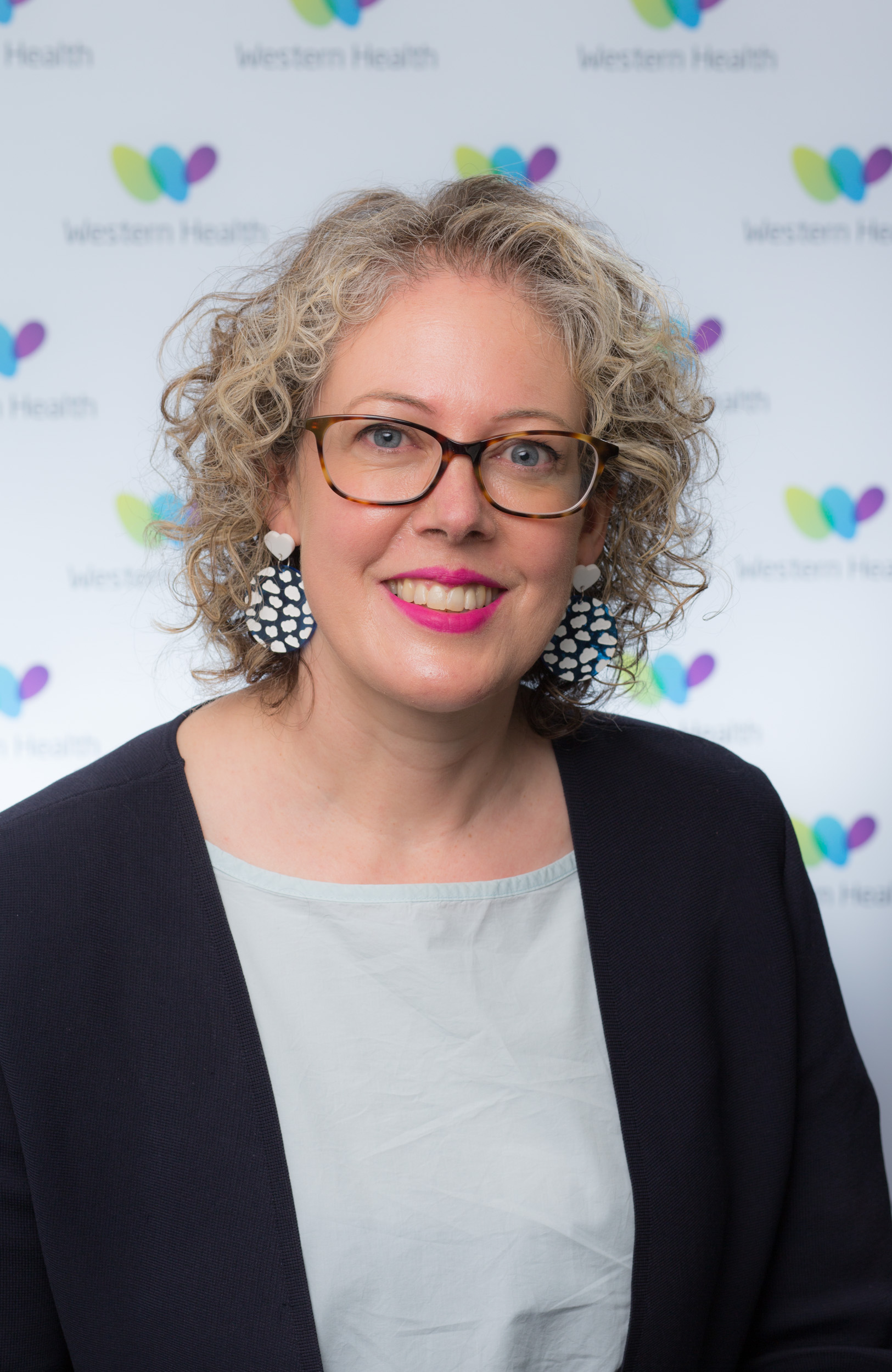
Kate Renzenbrink joined Western Health as our Director of Nursing and Midwifery Informatics (Chief Nursing and Midwifery Informatics Officer) on 25 October 2021. Kate has extensive experience as a nursing and midwifery leader and as an ambassador for effective digital health transformation at the National, State and local level.
Kate’s expertise as an innovation lead and skilled communicator have been crafted through roles which include most recently as Chief Nursing and Midwifery Information Officer at Bendigo Health and previously as Senior Policy Officer for Safer Care Victoria and Senior Advisor at the Victorian Agency for Health Information.
Kate lends her expertise to the My Health Record Clinical Advisory Group with the Victorian Department of Health, the Nursing and Midwifery group and Victorian Chief Informatics Officers’ group with the Australasian Institute of Digital Health and as Chair of the Nursing Informatics Community of Interest with the Australian College of Nursing.
I’m sure that you will all welcome Kate to the Western Health team.
UoM Centre for Digital Transformation Health scholarships
There is an opportunity to expand Western Health’s digital health capacity from a service and workforce perspective with a scholarship in offered by the Centre for Digital Transformation of Health in 2022, focused on:
- analysis of routinely-collected healthcare data to understand unwarranted variation in care
- designing digital health tools for virtual care
The University of Melbourne Centre for Digital Transformation Health, of which Western Health is a partner, is offering scholarships to support clinicians to participate in the 2022 Learning Health System Academy ( https://bit.ly/LHSA_info ). The Academy is a professional development program for clinicians to learn and implement data-driven and digital health-enabled clinical practice improvement through course-work and project based learning. It would require 2 days a week from February to December 2022.
The proposed project needs to be benefit WH (but could involve other institutions) and focus on one of the following areas:
- analysing routinely-collected healthcare data to understand unwarranted variation in care. Settings for projects within this scope could include (but are not limited to) outpatients, specialist clinics or shared care
- designing digital health tools for virtual care. Settings for projects within this scope could include (but are not limited to) Hospital in the Home or home monitoring.
Your participation and the project need evidence of Western Health support e.g. from your manager, including a plan for how the project could be integrated into Western Health activities. The CDTH will provide infrastructure and data analytics expertise.
Please click here for the Application form.
Initial applications close on 12 November, and Kate Renzenbrink is happy to support any nurses or midwives that would like to apply. Please send any application to Dr Oliver Daly (CMIO) via email oliver.daly@wh.org.au initially, and he will review it before submitting and can facilitate executive sponsorship.
Congrats to our new ADONM Bec Woltsche
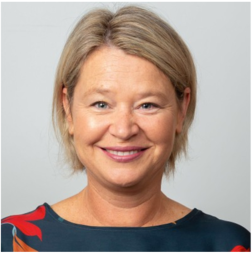
After a competitive process, we are delighted to have Rebecca Woltsche appointed as the Assistant Director of Nursing and Midwifery – Improving Care.
Rebecca has been acting in the ADONM – Improving Care role for the past six months and is well known for her outstanding contribution to the Falls Improvement Taskforce. Rebecca has also been awarded a Accelerating Innovation grant to pursue and further develop her innovative portable video monitoring project and the use of proximate alarm mats to reduce the rate of inpatient falls using co-design methodology.
Rebecca has worked at Western Health since 2008 and recently was the Unit Manager on Upper West Ward at Williamstown, achieving a high level of excellence in all ward KPI’s and compliments. Rebecca has also worked as a clinical education resource nurse supporting staff transition into the workplace and after hour’s administrator responsible for the coordination, supervision and operation of the Williamstown Hospital during the after-hours period.
Please join in congratulating Rebecca on her new appointment.
Checking into tea rooms

Having a break is really important during each shift, but let’s remember to do it as safely as possible.
Whilst at work, the tea room is the main place where we are not protected by PPE – so care needs to be taken.
Please remember to use the QR code for your tea room to check into the location as you enter. It is vital for contact tracing in case this is needed, and is the only way of accurately knowing who entered the room, and at what time.
All staff are encouraged to adhere to these infection prevention strategies when using tea rooms, to help minimise the risk of COVID-19 transmission, so please:
- Keep your distance from others
- Abide by the density quotient denoting the maximum number of people permitted in the room (as per signage found on the door and within each room)
- Keep at least 1.5 meters from others\
- Abide by the maximum number of people permitted to sit at any one table (as per table signage)
- Ensure the door to the break room remains closed
- Wash your hands before and after eating
- Prior to and after eating/ drinking please clean and disinfect the high touch surfaces you have used.
Enterprise Agreement 2020-24 update

The Notice of Employee Representational Rights (NERR) advises employees of their representation rights in enterprise bargaining negotiations. As part of the enterprise agreement implementation process, employers are required to issue a NERR when it agrees to bargain or initiates bargaining and take all reasonable steps to ensure eligible employees who will be covered by the new agreement have access to it.
Western Health issued the NERR to all of our nurses and midwives covered by the Nurses and Midwives (Victorian Public Health Sector) (Single Interest Employers) Enterprise Agreement on Friday 5 November 2021 via email, and the NERR was also placed on the Nursing & Midwifery microsite.
COVID Surge Allowance
The COVID Surge Support Allowance aims to retain highly skilled workers in the priority areas over the COVID surge and traditional holiday periods. The Allowance will provide an incentive for current staff to stay working in health services and attract those who have recently taken other roles in or outside the system. The Allowance will also support some part-time and casual healthcare workers to take up additional shifts in the acute settings when they are most needed.
All rostered or on-shift healthcare workers employed by public health services in key patient-facing roles will be eligible to receive the Allowance for each shift or period of continuous duty. Patient-facing roles are employees in a healthcare setting that provide direct face-to-face care to patients in-person (not virtual care).
The incentive will be aligned to the predicted COVID peak period and provided for a period of four-months from 11 October 2021 to 10 February 2022 reflecting the anticipated surge in hospitalisations during this period.
Patient-facing workers (including nurse and midwives) rostered to or on-shift in Red Zones will be eligible to receive an allowance of $60 per shift. Patient-facing workers (including nurses and midwives) rostered to or on-shift in Amber Zones will be eligible to receive an allowance of $30 per shift.
Red Zones include ICUs in streaming hospitals, COVID-19 wards (and COVID-19 hospital in the home settings where face-to face visits are deployed), EDs and MACs.
Amber Zones include ICUs, in non-streaming hospitals, non-COVID-19 wards (including maternity and acute mental health settings), Suspected COVID wards and urgent care centres.
Western Health has arranged for this allowance to be paid automatically.
New Alaris infusion pumps coming soon for Bacchus Marsh and Melton
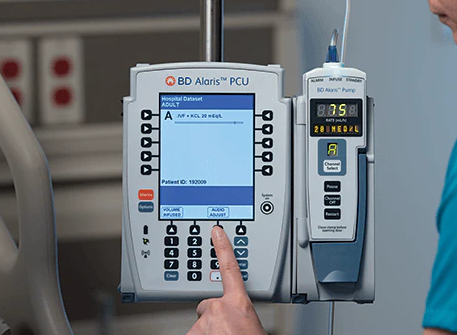
The Plum+ infusion pumps currently being utilised at Bacchus Marsh and Melton will be soon replaced by new BD Alaris pumps, which include dose error reduction software.
A working group is progressing plans for the implementation behind the scenes, which includes finalising the medication library for the dose error reduction software.
The new pump is the same as the one used at other Western Health sites, and will create consistency and improve patient safety. More information will be circulated including implementation dates and training opportunities once finalised.
Best Care at Bacchus Marsh, Melton and Caroline Springs
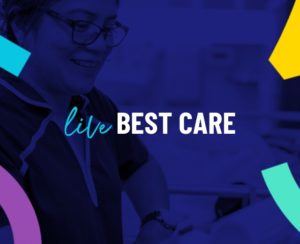
At Western Health, our vision for outstanding patient care is that each of our patients receives ‘Best Care’ from us, every time, everywhere.
Four months on from amalgamation, it is clear our colleagues at Bacchus Marsh, Melton and Caroline Springs sites share this vision – this can be seen in the everyday care of patients and in staffs’ endeavours to continually review and improve care.
To support and focus the great work of Bacchus Marsh, Melton and Caroline Springs staff and services to provide and improve care, the Western Health Best Care Framework is being rolled out across all sites. This Framework is an approach to clinical governance that focuses on care from the perspective of patients and translates this into day-to-day behaviours and systems supporting person-centred, coordinated, right and safe care for every patient.
The Best Care Framework roll-out was launched at Bacchus Marsh, Melton and Caroline Springs on 8 November 2021.
Click here to learn more about living Best Care at Bacchus Marsh, Melton and Caroline Springs.
Keep an eye out for an image of CEO Russell Harrison – the first 3 staff members who email Quality@djhs.org.au with an image of one of Russell’s exact locations within the ‘Living Best Care at Bacchus Marsh/Melton/Caroline Springs site’ and a short description of what Best Care means to them will receive a prize!
Bodil Chief Investigator in MRFF Research project
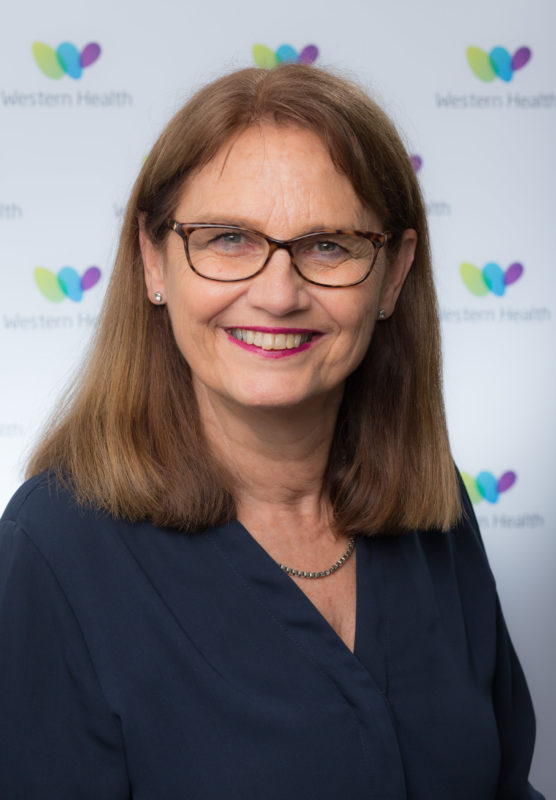
The Commonwealth Government recently announced support for nine Australian researchers with almost $62 million to improve the health and wellbeing of Australians by accelerating research knowledge and outcomes into health care and practice.
We are excited that Western Health’s own Chair of Nursing Professor Bodil Rasmussen is a Chief Investigator in one of these Medical Research Future Fund (MRFF) funded projects which received $9,067,407.
The research project is titled DELIVER: Delivering Enhanced heaLthcare at home through optImising Virtual tools for oldEr people in Rural and regional Australia, and is being led by Professor Anna Peeters from the Institute of Health Transformation, Deakin University and Western Alliance.
Bodil’s role in this research is in health service integration and evaluation of virtual healthcare tools and digital health literacy.
Congratulations to the team.
Benchmarking Best Care
The latest benchmark reports from the Health Roundtable that go up to June 2021 show how our delivery of Best Care compares to other health services across Australasia.
In our continuing series looking at nursing and midwifery key performance indicators, this month we will look at how we perform in the area of delirium.
Delirium:
Sunshine Hospital
The rates of delirium at Sunshine Hospital is in the green when compared to our peers, and keeping consistently low and dropping. This is a fantastic result.
Well done to our Sunshine Hospital teams.

Footscray Hospital
Rates of delirium at Footscray Hospital remain higher, with the last quarter us hitting the 75% percentile for the first time in a while. Our delirium rates are remaining fairly steady, and will need some further focus and attention.
Identifying and diagnosing delirium is great to be able to manage it, and we are doing this well. However the ideal is to prevent delirium occurring in the first place wherever possible through frequent reorientation, early and recurrent mobilisation, pain management, adequate nutrition and hydration, reducing sensory impairments, and ensuring proper sleep patterns. If you need any support, please contact Sharon Collard (CNC Delirium and Cognitive Health).

Influencing Aboriginal Cultural Safety Planning for 2022-25
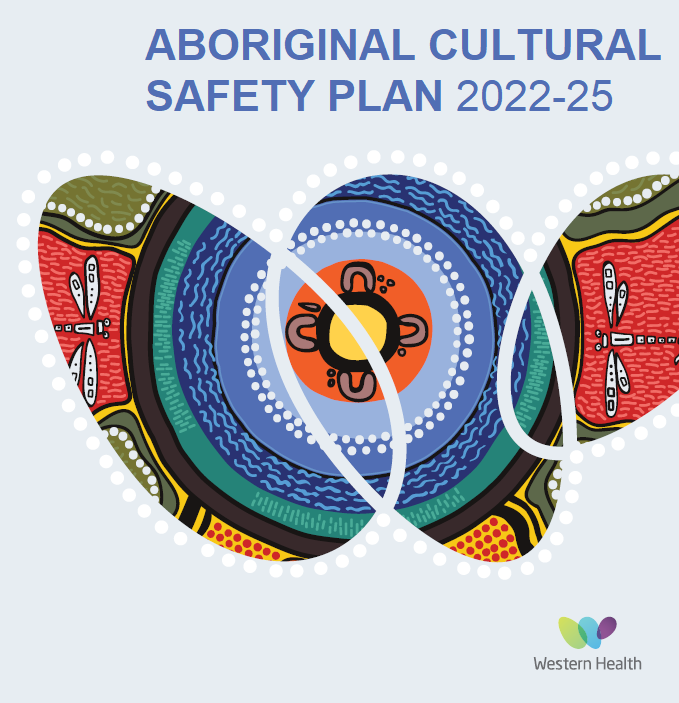
Western Health has contracted Professor Kerry Arabena and the team at Karabena Consulting to undertake an impact evaluation of Western Health’s Aboriginal Health Cultural Safety Plan 2019-2021 and make recommendations for the development of the next iteration, the Western Health Aboriginal Health Cultural Safety Plan 2022-2025. The team at Karabena Consulting will be working closely with Tanya Druce, Manager of Wilim Berrbang (Aboriginal Health) at Western Health, as well as the Western Health Aboriginal Health Steering Committee and the wider Aboriginal community.
Professor Kerry Arabena, Managing Director of Karabena Consulting, has over three decades of experience in Indigenous health and wellbeing at both a national and international level. Her insights, expertise and previous work will support Western Health in developing our next Cultural Safety Plan which will shape our commitment to patients and their families, our staff and volunteers over the next three years.
To assist us in the research, we invite you to take part in an online survey where we will ask questions that will help us:
- understand the impact of the 2019-2021 Cultural Safety Plan; and
- understand your vision for the future to better inform the recommendations for the 2022-2025 Cultural Safety Plan.
In recognition of the pressure staff are under, we have worked with Karabena Consulting to ensure that the approach to consultations is flexible and as accessible as possible, to better support your ability to engage how and when works best for you.
The survey can be found here.
If you wish to provide additional information, you will have the opportunity to opt-in for a semi-structured phone interview at the end of the survey. All respondents will go into the draw to win an original artwork by a local Aboriginal artist.
You may also be interested in signing up for a free self-care course being offered by Karabena Coaching, developed specifically to support health care workers during this challenging time. If you are interested, you can register here.
Should you have any questions about the Western Health Aboriginal Health Cultural Safety plan, please contact Tanya Druce – Tanya.Druce@wh.org.au
Maternity Connect continues to excel
 The Maternity Connect Program is a service operated by Western Health supporting upskilling the rural/regional maternity workforce across Victoria. The program was established in 2012 to support rural maternity services to effectively meet their maternity population care needs.
The Maternity Connect Program is a service operated by Western Health supporting upskilling the rural/regional maternity workforce across Victoria. The program was established in 2012 to support rural maternity services to effectively meet their maternity population care needs.
The program is a Clinical Placement learning model, based on health service level plans and individual learning needs. The program uses a multi-modal approach to meet the learning objectives of the service and the individual. A preceptorship model is used to supervise the placement and assess the practice of the individual.
Key Drivers for the Program include:
- In smaller rural maternity services, where the overall numbers of births are low, exposure to a range of clinical situations can be limited.
- Rural workforce issues, which include an aging midwifery workforce (average age >50yrs), has resulted in a high incidence of part-time employment.
- Midwives and nurses need to meet the requirements for continuing professional development for registration. Professional registration for midwives and nurses now mandates 20 hours per year of formal professional development for each registration. Additionally, the practice standard also requires midwives and nurses have sufficient clinical exposure in the preceding 5 years of practice.
- Strengthen the pathways supporting the care delivery of maternity service in rural and metropolitan areas across Victoria, through positive engagement and collaborative relationships.
Maternity Connect Program has achieved the following great results:
- 552 midwives/nurses having completed a placement since inception 2012 to September 2021.
- Nurses and midwives from 47 health services have participated in the program.
- 12 Metropolitan health services and 13 Regional Health services have provided placement opportunities.
Well done to Kylie Martin (maternity Connect Manager) and all involved for their fantastic accomplishments.
Emerging Evidence
The Western Health Library Service is a great source for locating the latest nursing and midwifery related evidence based practice and research. The COVID-19 articles below are available open access:
- Long-COVID: neurological manifestations and management. Journal of Neurology. 2021: December Full Text
- The overall impact of COVID-19 on healthcare during the pandemic: A multidisciplinary point of view. Health Science Reports. 2021: October Full Text
- Specialist consultation activity and costs in Australia: Before and after the introduction of COVID-19 telehealth funding. Journal of Telemedicine and Telecare. 2021: December Full Text
- Considerations for acute care staffing during a pandemic. Best Practice & Research. Clinical Anaesthesiology. 2021: October Full Text
- Experiences and attitudes of midwives during the birth of a pregnant woman with COVID-19 infection: A qualitative study. Women and Birth. 2021: September Full Text
- Preparing nursing homes for a second wave of coronavirus disease 2019 (COVID-19). Infection Control and Hospital Epidemiology. 2021: October Full Text
- Doubling intensive care unit capacity by surging onto medical-surgical units during the COVID-19 pandemic. Dimensions of Critical Care Nursing. 2021: November-December Full Text
- Risks of and from SARS-CoV-2 infection and COVID-19 in people with diabetes: a systematic review of reviews. Diabetes Care. 2021: October Full Text
- Assessment of cognitive function in patients after COVID-19 infection. JAMA Network Open. 2021: October 22 Full Text
New eBook Titles:
- Fast facts about LGBTQ+ care for nurses. Springer Publishing, 2022. Written in an easy-access bulleted format with concise paragraphs, this book sets the stage by examining the background and history of the LGBTQ+ population and focusing on the health disparities that set them apart. It addresses the nursing implications and care of LGBTQ+ patients in all practice settings, highlighting transgender medical, surgical, and mental health.
- AWHONN’s perinatal nursing. 5th edition. Wolters Kluwer, 2021. This freshly updated, comprehensive resource offers expert guidelines and best practices for the full range of patient care issues, from cultural practices and pregnancy complications to newborn assessments and nutrition. All chapters written by expert nurse clinicians and researchers, to support positive perinatal outcomes. Nursing staffing standards are included as they apply to each patient population. Ideal for those seeking certification in obstetrics nursing. (RNC-OB) and maternal newborn nursing (RN-MNN, RNC-LRN).
Please note: these eBook title links (on-site) should take you seamlessly to the full text of the eBook. Off-site or home access requires free library membership. If you are not a member you can Join Online. For more information Click on our FAQ page.
Visit the library’s Intranet website, or ring the library to speak with a Librarian: 8395 8036 or 8345 6655. Working from home? Visit the Library Internet site.

